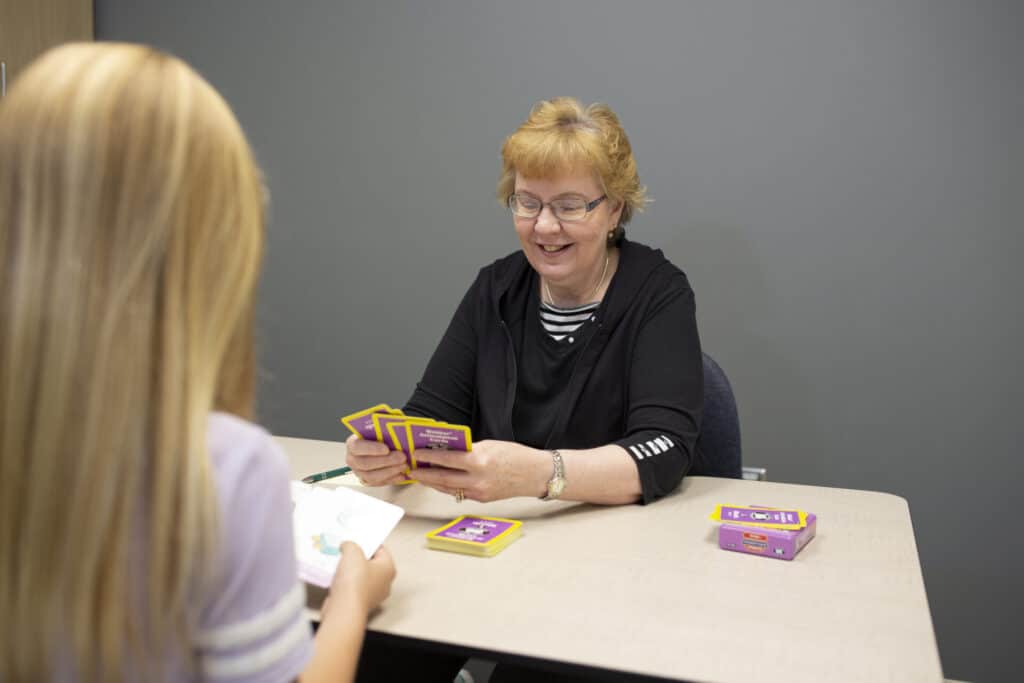Identify the Signs

Children develop at their own rate. Some children walk and talk early. Others take longer. Most children learn skills within an age range, such as between 12 and 18 months. A child who takes longer to learn a skill may have a problem. It is important that you know what to expect. Below are some signs of speech, language, and hearing problems. You will see the expected age range next to each skill.
Learn more about what to expect from your child from birth to five years old. You can also learn more about how to identify the signs.
Language Disorders
Language is made up of the words we use to share ideas and get what we want. Language includes speaking, understanding, reading, and writing. A child with a language disorder may have trouble with one or more of these skills.
Signs of language problems include:
- Birth–3 months
- Not smiling or playing with others.
- 4–7 months
- Not babbling.
- 7–12 months
- Making only a few sounds. Not using gestures, like waving or pointing.
- 7 months–2 years
- Not understanding what others say.
- 12–18 months
- Saying only a few words.
- 1½–2 years
- Not putting two words together.
- 2 years
- Saying fewer than 50 words .
- 2–3 years
- Having trouble playing and talking with other children.
- 2½–3 years
- Having problems with early reading and writing. For example, your child may not like to draw or look at books.
You can help your child learn language by
- Talking, reading, and playing with your child.
- Listening and responding to what your child says.
- Talking with your child in the language that you are most comfortable using.
- Teaching your child to speak another language, if you speak one.
- Talking about what you do and what your child does during the day.
- Using a lot of different words with your child.
- Using longer sentences, as your child gets older.
- Having your child play with other children.
Speech Sound Disorders
Speech is how we say sounds and words. It is normal for young children to say some sounds the wrong way. Some sounds do not develop until a child is 4, 5, or 6 years old. Signs of a speech sound disorder in young children include:
- 1–2 years
- Not saying p, b, m, h, and w the right way in words most of the time.
- 2–3 years
- Not saying k, g, f, t, d, and n the right way in words most of the time. Being hard to understand, even to people who know the child well.
You can help your child learn to say sounds by
- Saying sounds the right way when you talk. Your child needs good speech models.
- Not correcting speech sounds. It is okay if your child says some sounds the wrong way.
Stuttering
Most of us pause or repeat a sound or word when we speak. When this happens a lot, the person may stutter. Young children may stutter for a little while. This is normal and will go away over time. Signs that stuttering might not stop include:
2½–3 years
- Having a lot of trouble saying sounds or words.
- Repeating the first sounds of words, like “b-b-b-ball” for “ball.”
- Pausing a lot while talking.
- Stretching sounds out, like “fffffarm” for “farm.”
You can help your child by
- Giving your child time to talk.
- Not interrupting or stopping your child while he speaks.
- Noticing if your child gets upset when stuttering. Pay attention to how she speaks. Children who stutter may close their eyes or move their face or body when talking.
Voice Disorders
We use our voice to make sounds. Our voice can change when we use it the wrong way. We can lose our voice when we are sick or after talking or yelling a lot. Signs that your child may have a voice disorder include:
- Having a hoarse, scratchy, or breathy voice.
- Sounding nasal, or like he talks through his nose.
You can help your child by:
- Seeing a doctor if your child’s voice sounds different and it does not go away after a short time.
- Telling your child not to shout or scream.
- Keeping your child away from cigarette smoke.
Hearing Loss
Some children have a hearing loss at birth. Others lose their hearing as they get older. Some signs that your child may have a hearing loss include:
- Birth–1 year
- Not paying attention to sounds.
- 7 months–1 year
- Not responding when you call her name.
- 1–2 years
- Not following simple directions.
- Birth–3 years
- Having speech and language delays.
You can help your child by:
- Making sure your child has a newborn hearing screening.
- Taking your child to the doctor if he has an ear infection.
- Seeing an audiologist if you worry about your child’s hearing.
Act Today
Getting help early is better than waiting. Speech-language pathologists, or SLPs, help children who have language, speech sound, stuttering, or voice problems. Talk to your doctor about a referral to speech therapy.
Look for an SLP or audiologist who has earned the Certificate of Clinical Competence, or CCC, from ASHA. ASHA-certified SLPs have “CCC-SLP” after their names. ASHA-certified audiologists have “CCC-A” after their names.
To find a speech-language pathologist or audiologist near you, ASHA ProFind or visit our Rehabilitation Department page to learn more about services offered locally here at Windom Area Health!
By Joann Anderson, Speech Pathologist
